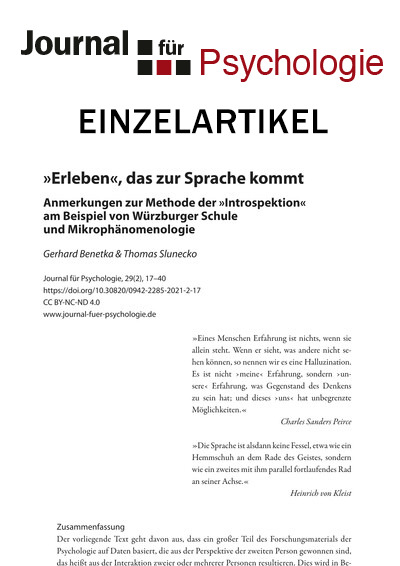»Experience« that comes to language
Notes on the method of introspection in the school of Würzburg and in microphenomenology
DOI:
https://doi.org/10.30820/0942-2285-2021-2-17Keywords:
Introspection, (micro-)phenomenology, school of Würzburg, dialogical methodology, qualitative social researchAbstract
This essay starts from the assumption that a good part of psychological research material is based on data obtained from the perspective of the second person, i.e., data that results from the interaction of two or more persons. We develop this assumption by means of two »introspective« approaches that both claim to facilitate the transfer of experience into language in a scientifically controlled setting: For the school of Würzburg we demonstrate that the process of protocolling amounts to a dialogical negotiation of meaning between experimenter and subject. We contrast this methodological approach with that of microphenomenology. Different to Bühler’s psychology of thinking, the latter’s ambition is not to recall a fixed past experience, but rather to actualize and unfold it. To take the dialogical moment into account helps us to avoid the confusion of »experience« and »account of experience«. In this light, the term »introspective« seems inappropriate both for the school of Würzburg and for microphenomenology. Regarding both approaches we critically object that they presume a »natural« relation between experience and its expression in language. It is due to this presumption that both have an inherent tendency to misunderstand a class specific way of articulating inner experience as a »natural« expression of this experience or of the phenomena in question, respectively.
Downloads
Published
2021-12-08
How to Cite
Benetka, Gerhard, and Thomas Slunecko. 2021. “»Experience« That Comes to Language: Notes on the Method of Introspection in the School of Würzburg and in Microphenomenology”. Journal für Psychologie 29 (2):17-40. https://doi.org/10.30820/0942-2285-2021-2-17.
Issue
Section
Artikel
License

This work is licensed under a Creative Commons Attribution-NonCommercial-NoDerivatives 4.0 International License.
This license allows private use and unmodified distribution, but prohibits editing and commercial use (further information can be found at: https://creativecommons.org/licenses/by-nc-nd/4.0/).
The terms of the Creative Commons licence only apply to the original material. The reuse of material from other sources (marked with a reference) such as charts, illustrations, photos and text extracts may require further permission for use from the respective copyrights holder.


